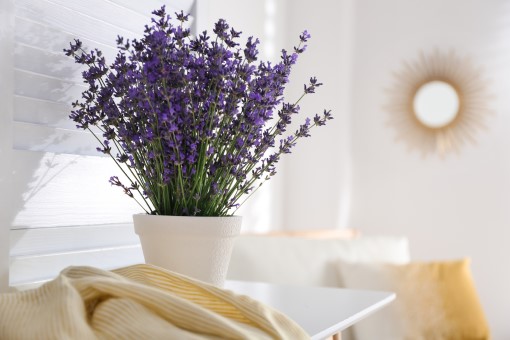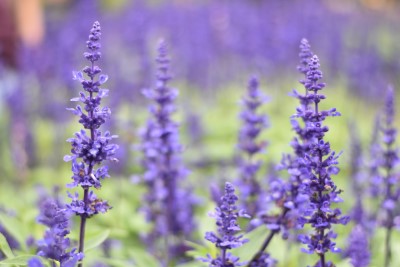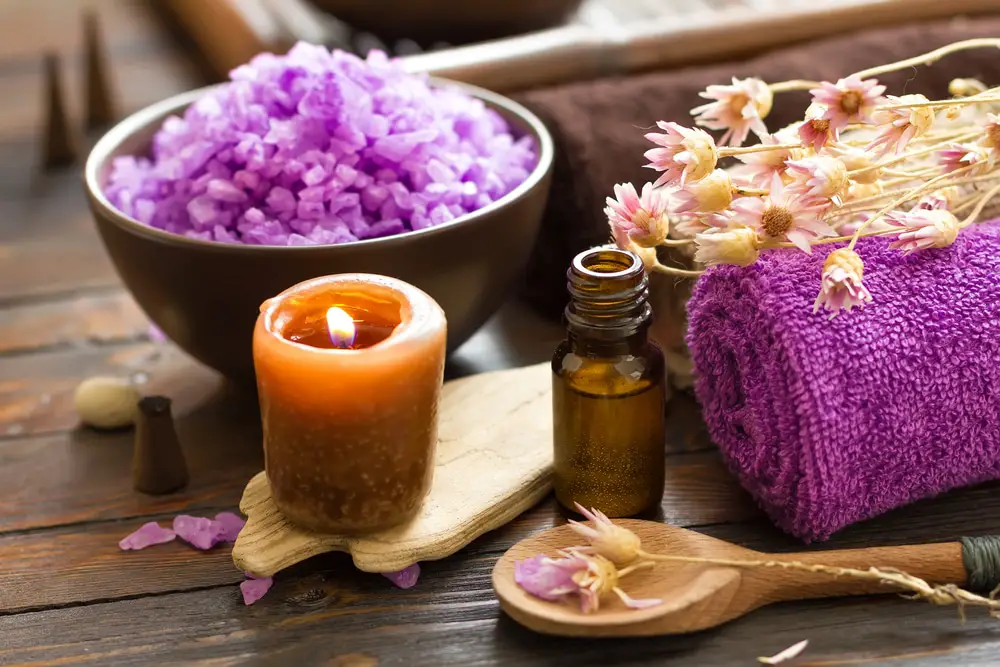
Can keeping a lavender plant in your bedroom for a sleep aid really help?
By Jason Wooden, PhD | March 15, 2021
While there’s no direct evidence for keeping a lavender plant in the bedroom as a sleep aid, it’s beauty and fragrance can create a more pleasant environment.
There are other ways that household plants may help sleep including improved mood, less stress and anxiety, and fewer allergens. For more potent sleep benefits, you can try lavender essential oils.
Why you’re thinking bedroom lavender plants instead of sleeping pills
If you’re thinking about keeping a lavender plant in your bedroom as a sleep aid, it’s no surprise given the growing interest in natural remedies.
And, with one in three adults struggling with sleep every night, there’s a huge need for practical remedies for insomnia.
It’s hard to get things done after a poor night of sleep. Yes, you’re dragging, but your brain doesn’t work as well as it should and you don’t cope as well. This makes for extra challenging days at home and at work.
You should know the stakes are even higher than that. Repeated nights of poor sleep over the long-term can increase your risk for other serious health issues including high blood pressure, cardiovascular disease, obesity, depression, and dementia.
So, anything you can do to help your sleep is welcome.
Stress and anxiety are common issues for sleep. Having a sleep environment that promotes sleep is also an important piece of the sleep puzzle.
Sleeping pills are popular due to their convenience and fast acting effects. Unfortunately, they can come with unpleasant side effects including headaches, constipation, gas, dizziness, and daytime fatigue.
Other risks to keep in mind include:
- they can be habit-forming
- developing a dependence on them
- rebound insomnia after withdrawal
Given the many downsides from sleep meds, I can see the appeal in plants as an alternative. They are natural, beautiful, can change the ambience of a room, and just might help your sleep.
There are certainly worse things you can put in your bedroom.
Lavender plants are recognizable for their beautiful color and sweet floral scent. They have been used for centuries for as a medicinal.
Traditionally, it’s been given as a tea, dried flowers in a sachet, or in a poultice. More recently, lavender essential oils have become popular as a more potent way to provide it’s many benefits.
Because of this, it’s to ask if keeping a lavender plant in your bedroom as a sleep aid is worth your time.
Can it really help your sleep?
Let’s take a look at how bedroom lavender plants may actually help as a sleep aid and how you can grow them in your bedroom.
What stress, anxiety, and mood does to your sleep
Before we get to how adding lavender plants to your bedroom may help your sleep, we need to look at some of the culprits for insomnia.
You probably are not surprised that stress and anxiety are some of the most common issues for sleep. It’s just hard to drift off to sleep when your mind is racing.
As you get more and more stressed out, your body may turn on the fight-or-flight response and pump out stressed hormones designed to get you in a heightened state of arousal and prepare your muscles for action.
Depression is just as bad for sleep. In fact, 75 percent of people with depression have trouble falling asleep or staying asleep.
Since sleep-deprived people are more at risk for anxiety and depression, you can end up in a downward spiral if you’re not careful.
So, you can see how important stress, anxiety, and mood are for sleep. Anything that can help you get more relaxed at bedtime can make it easier to fall asleep.
And there’s lots of things that affect your mood including your bedroom environment.
How bedroom lavender plants may aid your sleep
Okay, one thing you should know up front is that there isn’t any direct evidence that growing a lavender plant in a bedroom can promote sleep.
Most of the research showing the anti-anxiety and relaxation benefits of lavender is for essential oil extracts made from the flowers.
So, while it’s possible you could get some benefit if you can smell the fragrance of lavender growing in your bedroom, it’s not going to be anywhere as potent as a concentrated extract.
On the other hand, the pleasant fragrance of lavender can certainly help make for a more pleasant bedroom.
And having a great sleep environment is important for sleep.
It turns out there are other ways in which plants may improve the bedroom that could be beneficial to sleep:
1) Boost mental well-being
Research has shown that your environment can influence mood and sense of well-being. Indoor plants add color and vitality to a bedroom making it a more pleasant space that improves your mood.
2) Reduce stress
Indoor plants can have indirect psychological effects on health and stress. Studies have shown that interacting with indoor plants can reduce physiological and psychological stress.
One Japanese study found that employees that kept a small plant on their desk had lower levels of anxiety and stress at the end of a four-week period
3) Allergy relief
Allergies can make it hard to sleep and dust mites are one of the most common culprits. Researchers have found that rooms with plants have less dust than rooms with any foliage. Additionally, rooms with plants may contain up to 60% less airborne molds and bacteria than rooms without any greenery
4) Improve indoor air quality
This may be beneficial to people with things like Asthma, but it’s hard to say how much since the research so far is mixed.
Some research has shown indoor plants can help filter out indoor pollutants such as formaldehyde and benzene. However, a recent meta study concluded that potted plants do not improve air quality.
How beneficial this could be likely depends on the number and types of plants, how big they are, and the size of the indoor space.
So, those are the ways lavender plants may aid sleep. They can help create a more sleep-friendly environment – less stress and anxiety, improved mood, and possibly better air quality.
How to get a lavender plant for your bedroom
It turns out that most fragrant lavender types are the French Lavandula x intermedia and English lavender (Lavandula angustifolia) plants. However, what you really need is the best one to grow in your bedroom.
What you want is something that can tolerate the changing temperatures of a house.

French lavenders (Lavandula stoechas) are considered to be the best for indoors.
While they’re not as fragrant as the English lavenders, they’re more heat and drought resistant. And they will produce more flowers indoors and bloom for longer than other types.
Other choices include the Canary Island lavender (Lavandula canariensis) and the Fern leaf lavender (Lavandula multifida).
So, how best to get your lavenders plants?
You can certainly order a French lavender online.
However, it might be better to go to your local store and ask which species they sell will work best as an indoor house plant where you live. There are different French lavender varieties and they carry the more ideal for your area.
Also, unlike ordering online, you can visually inspect the plant before purchase.
Tips for keeping lavender plants in the bedroom as a sleep aid
Now that you know what to get, there are some other things to think about if you’re going to keep a lavender plant in your bedroom for your sleep.
Size:
It’s important to keep in the mind what space you have to work with. Most French lavenders can get pretty big with some varieties growing as much as 30 inches tall and 24 inches wide.
There are dwarf varieties that are small enough to sit on a window sill. However, I would want the biggest possible plant to have a biggest impact on my bedroom and to get more fragrant flowers.
You can use a plant stand or small table so you’re not limited to your window sill.

How many plants:
Similar to size, I would think the more the merrier depending on the space you have to work with. Again, the goal is to invigorate your bedroom with beautiful greenery and vibrant fragrant flowers.
Lighting:
Lavender plants needs bright light to thrive. A south facing window is preferred. If needed, you can use a grow light.
Potting and drainage:
You want a light soil mix that drains well such as potting soil mixed with limestone. For better drainage, use a quick-drying terra cotta pot.
Watering:
Important to avoid over watering, so water when the top inch of the soil is dry.
Learn more: How Often Should you Water Lavender Plants? (Gardenerreport.com)
Don’t stop with bedroom lavender plants as your only sleep aid
Adding a lavender plant will add more greenery and beauty to your bedroom. However, there are plenty of other things you can do to help your sleep.
Add more plants to the mix:
Lavender isn’t the only plant worth adding to your bedroom. Consider adding other indoor house plants that can invigorate your sleep environment.
Try lavender essential oils:
If you want to realize more of the benefits of lavender as a sleep aid, you can try lavender oil. It’s been shown in research to help with anxiety and improve sleep.
Sleep hygiene:
There are so many things that affect sleep and too many people have poor habits surrounding sleep. There’s a reason 1 in 3 adults struggle with insomnia.
Sleep hygiene involves the everyday habits that can make or break sleep. Poor sleep hygiene can sabotage the other things you do to avoid insomnia.
For better sleep hygiene, sleep experts suggest you:
- Keep consistent wake up & sleep times
- Avoid naps
- Exercise during the day
- Avoid large meals, alcohol, or stimulants such as caffeine before bedtime
- Maintain a regular bedtime routine
- Avoid using TVs, laptops, or other electronics before sleep
- Keep your bedroom dark, cool, quiet, & relaxing
Get a checkup:
It’s important to see a doctor, especially if your insomnia becomes a long-term problem.
Too many people aren’t aware that other health issues can cause or worsen sleep issues. This includes things like chronic pain, heartburn, cancer, dementia, and asthma. You may also be living with an undiagnosed sleep disorder such as obstructive sleep apnea.
If you’re feeling over anxious or down, be sure to do something about it. Anxiety and depression are major causes of insomnia.
You may also be interested in:
Are plants in the bedroom bad for allergies?
Sleeping with a dog and allergies
4 things to avoid if you keep a fish tank in your bedroom
What to do if too much light is keeping you awake
12 Things to try if a noisy neighbor is keeping you from sleeping
Caring for lavender plants indoor (smartgardenguide.com)
The Ultimate Beginner’s Guide to Indoor Plants (This Old House)
Sources:
1. “Talking Points”, World Sleep Society website
2. “Understanding the Side Effects of Sleeping Pills”, 2020, WebMD
3. “Learn the risks of sleep aids”, 2017, Harvard Health Publishing
4. “Lavender: History, Taxonomy, and Production”, 2020, NC State Extension website
5. “Depression and Sleep: Understanding the Connection”, Johns Hopkins Medicine website
6. “The Connection Between Your Home and Your Sense of Well-Being”, UW Health website
7. The basic roles of indoor plants in human health and comfort. Environ Sci Pollut Res Int. 2018 Dec;25(36):36087-36101.
8. “This 3-minute, $3 habit could lower your stress and anxiety at work”, 2020, cnbc.com
9. “Health Benefits of Houseplants”, WebMD
10. “Houseplants Make Air Healthier”, 2009, LiveScience
11. “8 Healthy Benefits of Indoor Plants, According to Horticulture Experts”, 2019, Prevention website
12. Potted plants do not improve indoor air quality: a review and analysis of reported VOC removal efficiencies. J Expo Sci Environ Epidemiol. 2020 Mar;30(2):253-261.
13. “Strongest Scented Lavenders”, gardenia.net
14. “Best Lavender for Growing Indoors”, gardenerreport.com
15. Effects of lavender on anxiety: A systematic review and meta-analysis. Phytomedicine. 2019 Dec;65:153099.
16. A systematic literature review and meta-analysis of the clinical effects of aroma inhalation therapy on sleep problems. Medicine (Baltimore). 2021 Mar 5;100(9):e24652.
Connect with us:
About Us
Better Sleep Simplified® was founded as a place for you to get clear and well-researched information.
Our goal is to make sure you know about your options so that you take action sooner rather than later.
Check us out on YouTube:
Watch and Learn
Helpful sleep tips, interesting sleep facts and statistics you want to know about
Affiliate Disclosure
This site is a participant in the Amazon Services LLC Associates Program and other affiliate advertising programs designed to provide a means for sites to earn advertising fees by advertising and linking to them.
Important: BetterSleepSimplified.com is for informational purposes only and is not intended or implied to be a substitute for professional medical advice, diagnosis, or treatment. Always consult a physician for sleep and health concerns. See additional information.
